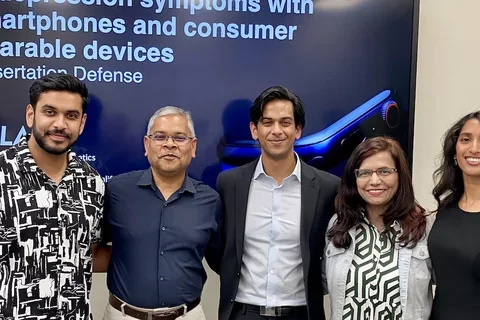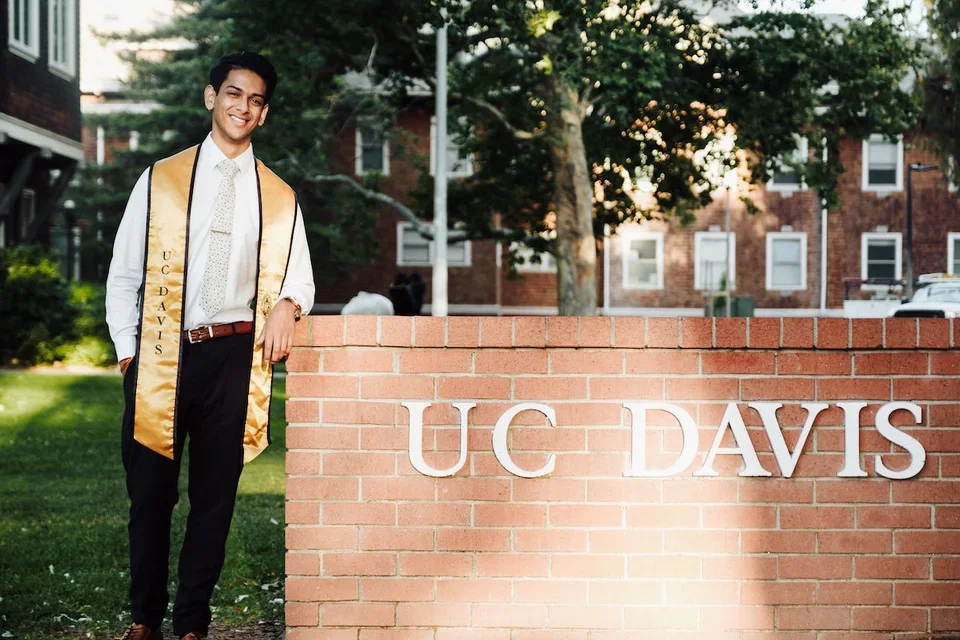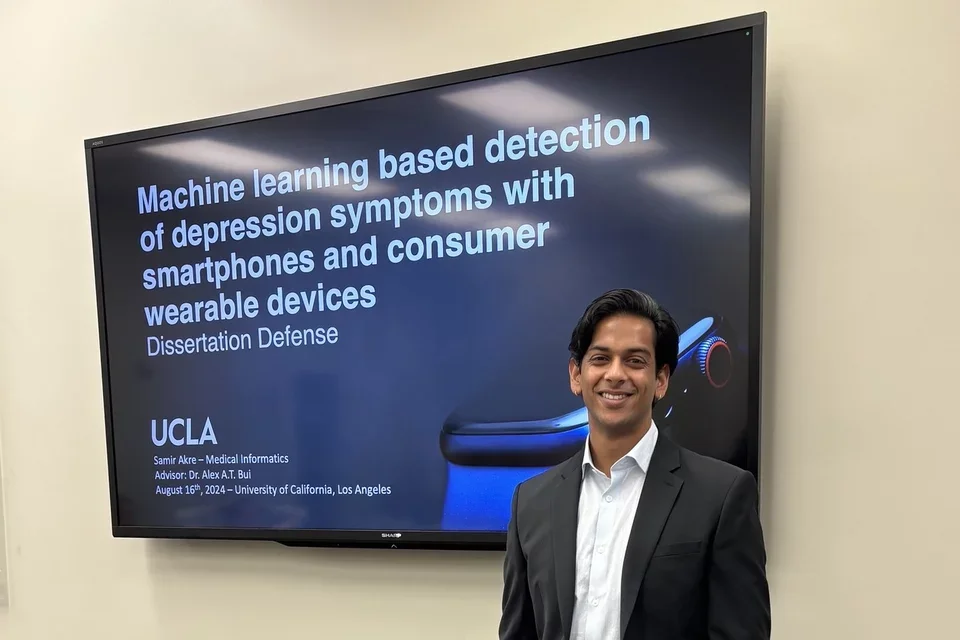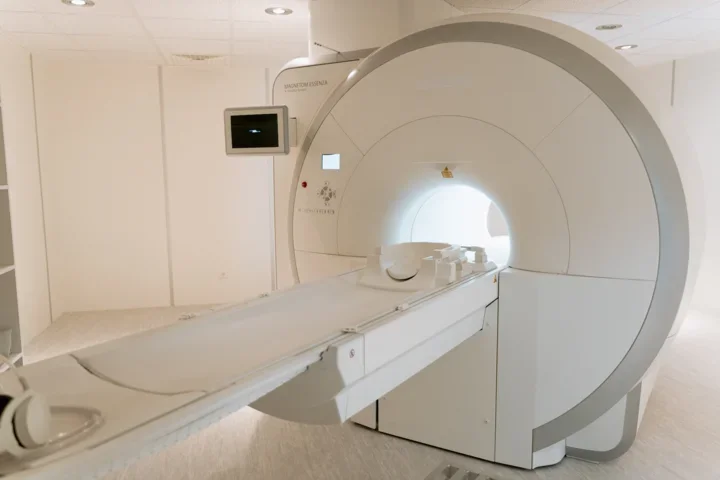Meet UCLA’s First Medical Informatics PhD
Student Spotlight

About Samir Akre (He/Him)
- UCLA PhD program: Medical Informatics
- Overarching research question: Can we use consumer wearable devices to better understand depression?
- Place he considers home: Northern California’s Bay Area
- Recent publication: Comparison of self-reported and physiological sleep quality from consumer devices to depression and neurocognitive performance” Akre, S., Cohen, Z.D., Welborn, A., Zbozinek, T. D., Balliu, B., Craske, M. G., Bui, A. A. T. Pre-print (Manuscript Under Review, NPJ Dig. Med, 2024). https://doi.org/10.21203/rs.3.rs-4769246/v1
Samir Akre investigates the ways consumer wearable devices might inform and improve how we understand mental health concerns.
He successfully defended his dissertation in August 2024, which means he’ll be the first student to earn a PhD in the new medical informatics Home Area within UCLA’s Graduate Programs in Bioscience.
After graduating from the University of California, Davis with a Bachelor of Science (BS) in biomedical engineering, Samir had no idea what he wanted to do next. Luckily, he saw an opportunity to invest time and attention toward figuring that out.
He worked in different roles at different labs and eventually came across a field he’d never heard of but felt immediately excited about: biomedical informatics.
The idea of doing scientific work so translational—with potential to directly inform clinical care—captured Samir’s interest. He’d always gravitated toward science that enabled him to immediately see a potential benefit and to clearly picture the patient population it could benefit.
In this budding field, he found the answer to the question evading him since his college graduation. He knew exactly what he wanted to do next.
He would pursue advanced education in biomedical informatics.

UCLA’s First Medical Informatics PhD
Samir felt thrilled to be heading in a specific direction, but he soon learned that fewer top-rated schools offered graduate programs focused specifically on biomedical informatics than he’d hoped.
He opened his search to include computational/bioinformatics PhD programs at academic medical centers.
“I knew that if I went to a school with a nearby medical campus, even if the program technically focused on computational informatics or bioinformatics, I could probably arrange my research to get it very closely aligned with biomedical informatics.”
Samir accepted an admission offer from UCLA’s graduate program in bioinformatics.
Before he started, he received a fortuitous surprise from faculty leaders, including his advisor Alex Bui, PhD, Senior Associate Dean for Bioscience Graduate and Postdoctoral Affairs at the David Geffen School of Medicine at UCLA (DGSOM).
They’d just created a brand-new program. If he was interested, he had the opportunity to get his PhD in medical informatics.
Samir couldn’t believe his luck and impeccable timing. He’d arrived at UCLA just in time to begin working toward a PhD in the field he’d been most interested in.

Now, nearing the end of his time with the medical informatics Home Area, Samir feels every bit as lucky as he did when he first learned about the new program.
He’s found investigating the potential of smartphones and wearable devices, such as the Apple Watch, to clarify depression equal parts rewarding and fascinating, and his work’s translational potential remains as compelling as ever.
“A lot of people want to wear these devices,” Samir says.
“If we can demonstrate how these devices offer a clear utility in relation to something as subjective as mental health, it could significantly benefit the understanding and practice of psychiatry and/or psychology.”
Day in the Life of a PhD Candidate Defending Their Dissertation
A PhD program’s intense study culminates with the dissertation defense. During the event, which generally lasts a few hours, a PhD candidate presents on the most significant points from their completed dissertation.
“To me, defending my dissertation essentially means my committee will determine if my research is worthy of a PhD,” Samir said just moments before starting his own defense.
In short, the dissertation defense determines if a candidate will earn the PhD they’ve been working toward for years. (Back in 2019, the U.S. News and World Report put the average time to earn a PhD at 6 years.)
Nearing this critical juncture creates some understandable nervousness. For example, Samir found himself thinking about how each of the incredibly busy esteemed professors on his committee had all made themselves available for his defense.
“I’m pretty sure I’ll pass, but if I don’t, it will be really awkward for a lot of people who have put a lot of time and effort into making this happen and making themselves available,” he says. “There’s a lot of pressure to present a successful defense.”

Life After the Dissertation Defense
Samir’s pre-defense concerns, while relatable, proved groundless.
“I could tell the rest of his committee was extremely pleased with the defense,” said Samir’s advisor Dr. Bui immediately after the presentation.
“He clearly put a lot of thought and effort into summarizing what he’s been working on, and he also presented himself very well.”
Dr. Bui has enjoyed watching Samir learn and grow as an individual and researcher over the years.
“Samir is our first medical informatics PhD, so he gets that honor,” Dr. Bui said. “And he set the bar high. He’s been a great example to others, and I’m proud he was my student. I learned a lot from him.”
Samir’s wife echoed Dr. Bui’s sentiments.
“You can tell how passionate he is about this work,” she said. “I’m immensely proud of him. He’s always taken so much care in his research—always has his heart and mind in the right place.”
Samir had a slightly harder time accessing his own feelings and impressions following the defense. He felt happy to have passed, but the achievement felt almost too significant to process all at once.
“This is definitely a big deal, so I think it’s hard for me to feel it all happening,” he explained.
He’ll have plenty of time to process and savor the fruits of his hard work as he gradually transitions away from student life. After taking a well-earned celebratory surfing trip, he’ll wrap up his current student projects and stay at UCLA as a staff researcher until December.
Eventually, he hopes to get involved with a mid-stage startup in the digital mental health space.

Time will clarify his specific next steps, but directly after Samir’s defense, his wife perfectly encapsulated what it means for him to successfully complete the most challenging milestone of his PhD journey.
“We got married twice this year, so this is the third major life event of the year for us,” she said. “We’re excited now to simply live our lives.”



